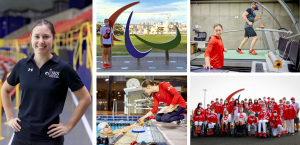Myriam Paquette

Photo credits : La Presse / Photo courtesy of Myriam Paquette / INS Québec
Professional background
Profession: Exercise Physiologist
Olympic Games: Tokyo 2020
Tokyo 2020 Sport: Para Swimming
Q. Was there a specific time in your life when you said to yourself that you wanted to work with high performance athletes or who would be going to the Olympic/Paralympic Games?
A. “I would say that my interest developed during my bachelor’s degree in kinesiology. Above all, I liked the challenge of optimizing training for high performance athletes. This passion for the body’s ability to adapt to training led me to INS Quebec and led me to work with Olympic and Paralympic athletes and I feel very privileged to join them at the Games.”
Q. How do you encourage your athletes every day to continue training and achieve their goals?
A. “With the athletes, our Integrated Support Team (IST) and coaches identify the athletes’ goals and put in place a plan for the athletes to achieve them. We also set up a series of tests to assess progress towards its goals and to adapt the plan if needed. This method allows the athlete to better define his goals and control progress towards them. I also try to bring my energy and my positive attitude to every training session in order to create an engaging climate for the athletes.”
Q. What exactly is your role at the Games and with which sport?
A. “I support the para-swimming and para-cycling teams. Both sports are at the Tokyo Paralympic Games, but take place in different cities (Tokyo for Para-swimming / Izu and Fuji for Para-cycling). While supporting the para cycling team online from Tokyo during the Games, I am fully involved and onsite with the para swimming team. I act as an exercise physiologist and as the IST team leader. As a physiologist, I have several tasks: I advise coaches on the training of the athletes; I take care of the planning of the sharpening period; I monitor athletes’ fatigue and response to training to help coaches adjust training to achieve peak performance on the day of the competition; I advise and supervise athletes such as warm-up and cool-down plans; I help athletes and coaches prepare for environmental stresses, including jet lag and the heat, especially here in Tokyo. As the IST team leader, I coordinate performance support services for the team.”
Q. How is the psychological and physical preparation of athletes different for the Games than any other competition?
A. “On a training year scale, preparing athletes for the Games is similar to preparing them for a major competition at the physical level, meaning that it is the major peak performance in the annual training cycle and that training is organized so the best performance of the athletes is at these Games. The Paralympic Games are also part of a four-year training cycle (five years this time around!), a four-year plan, where interventions, innovation projects, training programs, choice of competitions, are all geared towards achieving peak performance at the end of the four years.”
Q. Can you share any advice that is important to you in your field?
A. “On my very first day at INS Québec, six years ago, Nicolas Berryman, exercise physiologist at the time, asked me what kind of challenges I was expecting in my new role. I told him something related to the knowledge and expertise in the field to be a good exercise physiologist. He replied: “The biggest challenge is to create a relationship of respect and mutual trust with the coaches and the teams you work with. Without this strong relationship, you can’t have a positive impact on the team.” It was great advice, and his statement is so true !”
Q. Dr. Andréane Bourgeois is also on site for the Paralympic Games for Para-swimming. How do you collaborate?
A. “With all members of the IST, we communicate daily throughout the year, but even more intensively during the pre-camps and the Games. We discuss the health and performance of athletes in order to optimize our services and offer advice to coaches. By working together and being with each another almost 24/7 during these camps and competitions, we create strong bonds between us that help to work effectively as a team the rest of the year.”
Q. What excites you the most about your job?
A. “I am passionate about it. If I am here, it’s because I have followed my passions. What motivates me the most as an exercise physiologist is helping athletes and coaches achieve their dreams. The athletes, coaches and other members of the IST give me so much in return on a daily basis.”
Q. How do you balance work and personal life?
A. “There are times when work takes up my time almost 24 hours a day like right now [laughter], but outside of those times I’m very good at keeping a balanced schedule for myself. My computer is off on evenings and weekends, I don’t check my emails, I workout, and I spend time with family and friends.”